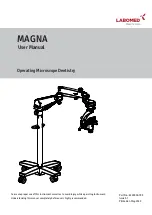
The table below shows parameters that can be changed on DIP switch block SW3 when programming the 6416Y2
manually. Remember that any combination of DIP switches 1‑4 can be used to allow remote control data to be
sent to a specific range of active Pro64 mic preamp channels.
DIP Switch Block SW3 Settings
DIP Switch
Parameter
Down
Up
1
m‑control Channel/Slot Control 1‑16
Control off
Control on (1‑16)
2
m‑control Channel/Slot Control 17‑32
Control off
Control on (17‑32)
3
m‑control Channel/Slot Control 33‑48
Control off
Control on (33‑48)
4
m‑control Channel/Slot Control 49‑64
Control off
Control on (49‑64)
5
RS‑422 Control Source Select
Use backplane connector
Use DB9 Remote
connector
6
Pad Mode
Manual
Auto
7/8
Control Group
See table below
Control Group
DIP Switch 7
DIP Switch 8
1
Down
Down
2
Up
Down
3
Down
Up
4
Up
Up
The m‑control Channel/Slot Control settings are separate from the audio I/O setup (including A‑Net Transmit and
Receive settings). This parameter sets up remote control communications for all 6416Y2 cards installed in the
same console. Each 6416Y2 card needs its A‑Net Transmit and A‑Net Receive range properly configured in order
to get the desired results for your application.
DIP Switch Block (SW4)
The DB9 RS‑232/422 Virtual Data Cable (VDC) port on the 6416Y2 card’s front panel is configured using SW4.
Use the eight DIP switches in this block to choose baud rate settings for communicating with other RS‑232/422
compatible devices. Setting these switches properly is an important part of the firmware update process.
The switches on SW4 have the following functions.
Switch
Function Off (down)
Function On (up)
1
One Stop Bit
Two Stop Bits
2
7 Data Bits
8 Data Bits
3
Parity Even
Parity Odd
4
No Parity
Parity
5
Baud Rate Select
See Baud Rate Table
6
7
8
30
dIP s
wItch
f
unctIons
















































